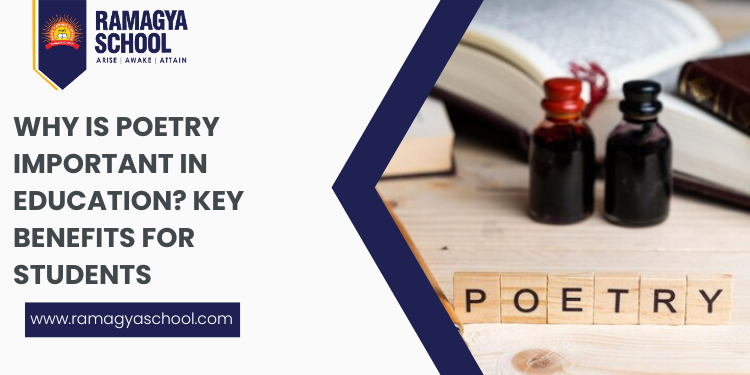Poetry plays a vital role in education, offering students opportunities to develop essential skills and explore their creativity. Its importance goes beyond academic development, fostering emotional expression and enhancing critical thinking.
This blog will outline the importance of poetry in education and highlight the key benefits of poetry for students, showing why it should remain a core part of learning.
1. The Importance of Poetry in Education: Enhancing Language Skills
- Vocabulary Expansion: Students are introduced to poetry by introducing them to an extensive variety of phrases and words that help them to expand their vocabulary. Through the exposure to figurative language as well as poetic styles, students discover new ways of expressing themselves. It is one of the best benefits of poetry for students.
- Improved grammar and Syntax: Through the study of the poetic structure of a sentence, students learn how grammar and word order influence the meaning. They can appreciate the way that minor changes to sentence structure can profoundly alter the tone or content.
- Building Reading Comprehension: The interpretive quality of poetry enhances students ability to distinguish through the text, resulting in improved comprehension abilities across all kinds of texts.
2. Poetry in Education: Encouraging Creativity and Imagination
- Turns Creativity Thinking: The wide-ranging nature of poetry inspires students to think imaginatively. They are taught how to interpret abstract concepts, images and concepts in their own distinctive ways, which helps to foster thinking independently.
- Inspires Experimentation: Poetry allows students to experiment with language structures, and concepts. This allows them to discover their own voice and discover new perspectives.
- Supports Problem Solving: Poetry’s creative spirit assists students in approaching challenges from a variety of angles, increasing their problem-solving skills.
3. The Importance of Poetry in Education: Emotional Expression and Empathy
- Facilitates Self-Expression: Poetry is a very personal and often emotional type of writing, which allows students to share their thoughts as well as thoughts within a secure creative and safe space. It is a great way for emotions to maintain mental health.
- Builds Empathy: Reading and understanding poetry can help students to understand the feelings of other people, developing compassion and emotional awareness. Knowing the emotions behind poems can help students become more compassionate when they interact with others.
- Develops Emotional Awareness: Engaging with the complex poems students are taught to identify and manage their own emotions more effectively which makes them emotionally mature.
4. Poetry in Education: Strengthening Critical Thinking Skills
- Interpreting Abstract Ideas: The figurative language of poetry challenges students to consider their thoughts and interpretations critically, as well as deeper meanings, which improves their analytical abilities.
- Inspires Discussion and Debate: Poetry is often the source of various interpretations. This could lead to lively debates and discussions. Students are taught to communicate their ideas in a clear manner while recognizing the different viewpoints.
- Connecting Themes: Reading poetry to understand themes helps students understand different concepts expanding their knowledge of literature, culture and their own life experiences.
5. The Benefits of Poetry for Students: Enhancing Memory and Focus
- Memorization Skills: The act of reciting poems helps students build their memorization skills, which is beneficial for other subjects that require the retention of information.
- Improving Attention to Detail: The intricate poetic language and rhythm require attention to detail when reading. Attention to detail can help students to develop focus and perseverance when they are working on their academic assignments.
- Boosting Cognitive Skills: The process of studying and reciting poetry improves cognitive skills, like the ability to focus as well as pattern recognition and logic.
6. The Importance of Poetry in Education: Cultural Awareness and Appreciation
- Understanding Diverse Perspectives: Poetry from various cultures exposes students to a diverse range of worldviews as well as historical contexts, enhancing their knowledge of global issues and their cultural diversity.
- Fostering Cultural Appreciation: By looking at poetry from diverse cultures and traditions students develop a greater appreciation of the culture’s values, heritage and the experiences.
- Promoting Inclusion Poetry: In education, poetry encourages inclusiveness by speaking up for marginalized perspectives and encouraging students to be aware of diversity around them.
7. Poetry in Education: Developing Confidence and Public Speaking Skills
- Boost Confidence: Poems read before a group of friends can improve the confidence of students and enhance their public speaking skills. Poetry readings can help students speak clearly and emotionally.
- Enhancing Verbal Expression: Practice the art of presenting poetry in a formal manner enhances the verbal communication, pronunciation and articulation, assisting students to express their ideas more efficiently.
Conclusion: The Lasting Importance of Poetry in Education
In the end, the importance of poetry in the classroom goes beyond creativity and language arts. The benefits that poetry can bring to students include improved communication skills as well as emotional intelligence, imagination and critical thinking all of which are essential to their overall academic and personal growth.
Poetry is an evergreen form of art that plays an important role in creating an empathetic, well-rounded and articulate people. Instilling poetry into the classroom will ensure that students do not just excel academically, but also develop in their creativity and emotional well-being in preparation for a brighter future.
Read More: Illuminating Minds: The Profound Importance of Studying Literature





